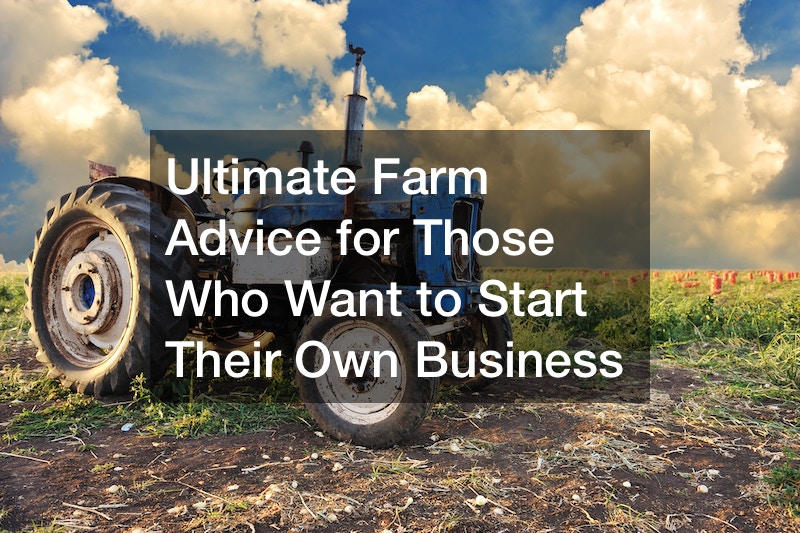
A farming business is fulfilling and rewarding. However, it can also be a high-risk business if you aren’t ready for the planning, hard work, and dedication that goes into it. You’ll need to work with others, learn best practices, and protect yourself from potential litigation. You’ll also need to understand the science of crops and animal husbandry to appreciate what’s happening on your farm. However, starting a farm business doesn’t need a green thumb. All you need is a passion for business and a commitment to succeed against all odds. Below is the ultimate farm guide on what you need to consider when starting your own business:

1. Make a Plan
Before starting a farming business, take your time to decide which type of farming you want to be involved in. There are various things to consider, such as the soil conditions, the local climate, the type of farming you want to do, the demand for the type of farming you want to invest in, and potential advantages, disadvantages, and challenges of this kind of farming. As a business owner, it’s always prudent to research, educate yourself, visit farms, and get reliable farm advice from other farmers or professionals before starting your own business.
You should also come up with a well-detailed business plan. This is essential for the success of any farm business. In the business plan, incorporate your personal goals, target market, financial projections, plans for production, potential marketing strategies and channels, and functional and realistic budgets. Once this is in place, get experts to curate a custom consultation service to fine-tune your business plan. A well-thought-out business plan will guide your decisions and vision, especially when seeking extra financing if needed.
2. Purchase Equipment
Once you’ve developed a business plan and identified what you want to farm, get quality equipment appropriate for your needs. Carefully and diligently assess the needs of your potential farm, considering the scale of operation and various tasks that’ll need both tools and machinery. Outline the tools you’ll need and prioritize essential ones based on immediate and future needs.
Getting quality equipment to keep your produce safe and well-ventilated against pests and moisture, such as a quality grain bin, is necessary if you’re looking to keep grains in a properly ventilated and protected environment. Regular inspection and maintenance will ensure the grain is of good quality and your stored crops are safe. You may get a used one or buy a new one. New equipment comes with warranties and often comes fitted with the latest technology. However, this could be an expensive option if you’re just starting. Besides, a piece of used equipment can do the same work if it’s in good condition. Weigh your options before purchasing equipment.
Maintenance cost is another key factor when purchasing farm equipment. Have a budget for maintenance that factors in costs and frequency. Since regular maintenance will make your equipment more efficient, you’ll avoid fixing bigger issues.
Purchasing your farm’s equipment is crucial for your business. Build relationships with equipment dealers and suppliers who can provide credible farm advice. Look into equipment financing options, research, plan, and make informed decisions that align with your long-term goals and vision.

3. Keep the Interior Cool
In as much as outdoor farming may not need an HVAC system, certain circumstances may require one to install these systems. Installing an HVAC system will help control the environment on the farm if you’re considering doing greenhouse farming or vertical farming. This is also essential for seedling production before transplanting them to the outdoors, as proper growth conditions lead to germination and successful seedling growth.
Seek the farm advice of a competent commercial HVAC company on the necessary systems required. They can also help with installation. HVAC systems are crucial in regulating humidity, temperature, and ventilation to create optimal crop conditions, especially in areas that experience extreme weather. Proper ventilation is crucial in preserving crop quality and increasing its longevity. Humidity leads to spoilage and may cause food poisoning.
An HVAC system can help if you want to go into livestock farming, especially poultry or swine farming. These animals require specific conditions to thrive. Having properly ventilated areas for your livestock and temperature regulation is crucial to reducing stress and the outbreak of diseases.
4. Plant Maintenance
When running a farm for business, you need to know how to maintain your plants. You may make losses instead of profits if you don’t know the basics. One essential aspect is your crop’s health and productivity. This process involves proper plant maintenance practices, including pruning, using the right fertilizer, watering, and pest control. These are the basics of caring for plants. Well-maintained plants tend to be more resilient against diseases and environmental stressors such as varying weather conditions, which may affect the overall harvest and produce quality.
You’ll need to understand how to do sustainable farming practices that protect your plants and the environment. Practices such as integrated pest management, crop rotation, and cover cropping may promote the health of the surrounding soil and biodiversity. They’ll also contribute to the long-term farm viability, which aligns with consumer demand for more environmentally friendly and ethically produced farm food.
Look for mentors to give you sound farm advice before venturing into this business. Consider shadowing some to understand various farm management practices. Your knowledge of how to maintain the plants on your farm will determine your farm’s overall efficiency and productivity.

5. Protect Your Property
Protecting your farm is crucial as it affects your success and the sustainability of your farm business. Prohibit trespassing and unauthorized access to your fame to safeguard against theft and property damage. This will also stay biosecurity risks for your crops or animals. Install proper security measures such as a perimeter fence around your farm, security cameras, and alarm systems to monitor the farm. Ensure proper lighting in and out of the farm, and implement various biosecurity protocols to prevent the introduction or spread of various diseases within the farm. Hire a professional local security company for farm advice on what works best in the area.
If you have a greenhouse or poultry house, consider a door lock installation to keep people off your farm. These measures will keep your farm safe and secure. Do a proper risk assessment of your farm to identify potential threats and vulnerabilities to help implement a comprehensive security plan for your farm property.
6. Get Insurance
Insurance is a critical part of your farm’s business. You need to secure yourself from risks and uncertainties. Insurance benefits include protection from inherent risks such as natural disasters, pests, market volatility, weather, and diseases. Farm crop insurance helps provide a safety net for mitigating such risks and recovering from losses. It lets you focus on the day’s operations without fretting over potential risks.
Insurance secures your farm’s physical assets from damage, such as vandalism, fire, theft, and other perils you may encounter. It helps with replacement or repair depending on the extent of damage.
Insurance protects you from lawsuits resulting from accidents, injuries caused by machinery, or damaged property. Since a farm has employees and visitors, have an insurance cover that protects you from potential lawsuits. Also, seek farm advice from fellow farmers and legal counsel on the most appropriate farm insurance cover.

7. Landscaping
For a farm to succeed, make it look good through landscaping and ensure it’s fit for planting crops. Well-landscaped farms make it easy for workers to go around collecting the produce in sections. It also helps with separating and identification of diseased crops. This is a good way of maintaining your farm’s esthetics while capitalizing on time and effort to address various farm needs. Besides, having a beautiful landscape can attract visitors to your farm, which can help boost your sales.
Soil erosion is also a big concern in farming. However, you can call in a landscaper to control soil erosion while offering expert farm advice on properly planting specific shrubs and trees and placing gabions, trenches, and ground cover. You do this to stabilize the soil, reduce water runoff, and protect the rich topsoil to help promote better, healthy soil for increased productivity. The trees act as windbreakers to protect your crops, livestock, and farm infrastructure from strong winds. This is a clever way of taking care of your farm and the ecosystem around your farm.
Nevertheless, landscaping attracts wildlife and insects that naturally help manage pests on your farm. This may be a good thing as it encourages biodiversity on your farm, supporting the ecosystem’s health and ecological balance.
8. Branded Merchandise
To make farming a serious business, you need proper marketing strategies. These include having your brand visible and recognizable. People should associate your name or brand with a particular color or logo. From t-shirts and branded vans to packaging bags, branding is everything.
On marketing and promotion, give your visitors a t-shirt upon visiting your farm, or sell goods to them at a subsidized rate. Do bulk screen printing to make the merchandise affordable, as printing single items can be costly. Also, branded merchandise is free advertising for your business and encourages community engagement. Find ways of involving the local community as you market your business. Hire a brand manager to give farm advice and develop strategies for marketing your business. Or you can choose to partner with or sponsor a few local brands for more visibility. These may include your clients, potential customers, suppliers, and the community.
To get repeat customers, always reward customer loyalty through giveaways and awarding the winners in each category. This is a great way to connect customers with your brand, which could result in repeat business and crucial referral advertising.
9. Protect Yourself Legally
If you’re planning on owning a farm, you need to protect yourself legally to avoid potential lawsuits that could lead to the closure of your business. There are various compliance regulations each farm must meet depending on the local, state, or federal regulations. These include the use of land, the protection of natural resources, environmental laws, food safety and handling, and labor laws, among others. You must fully understand what it entails to avoid penalties while ensuring your farm’s legitimacy.
You must protect yourself and the farm from inherent risks such as crop damage, your employees or visitors, accidents, and livestock issues. Having someone handle legal matters is essential as they are experts. A lawyer can help with deeds, contractual agreements, taxation, succession planning, and drafting patents, trademarks, or copyrights in the case of assets.
Issues to do with labor laws and employment are common in a farm. It would be best to have a workers comp lawyer who can give sound farm advice on farm-related labor matters while building a fair and safe working environment for all your employees. A lawyer will handle eventualities such as accidents and compensations for injuries on the farm. You also avoid wage compliance issues as the lawyer understands fair wages and workplace standards and can help you mitigate legal risks and protect your farm’s reputation. So, always seek legally qualified professionals for such instances.
10. Keep Vehicles Operational
Farm equipment gets worn out or damaged due to issues such as the passage of time, wear and tear from the weather, and the terrain. Constantly service your equipment and vehicles as they affect the productivity of the farm and business. Having well-maintained vehicles will help with the uninterrupted operation of your day-to-day farming operations, such as planting, plowing, harvesting, and also transportation of the crops. Get a qualified in-house mechanic to help with repairs early on before they become emergencies. They can provide farm advice on the best type of farming vehicles to purchase and have a maintenance schedule to keep them running.
You’ll also need to network with suppliers, such as auto glass repair shops, garages, and mechanics, who you can turn to for vehicle issues. For the vehicles to be running at all times, regularly service them to reduce or eliminate downtimes. Maintaining them also increases their resale value and compliance with emission standards to promote sustainable farming practices and fuel efficiency.
Having a farm may look like a lot of work, and it is, but once you get it right from the start, all will be well. Conduct in-depth research on your niche, get qualified professionals to help you set everything up, hire the right staff, get mentors who can give sound farm advice, and keep learning. Remember these tips to start the farm of your dreams!





